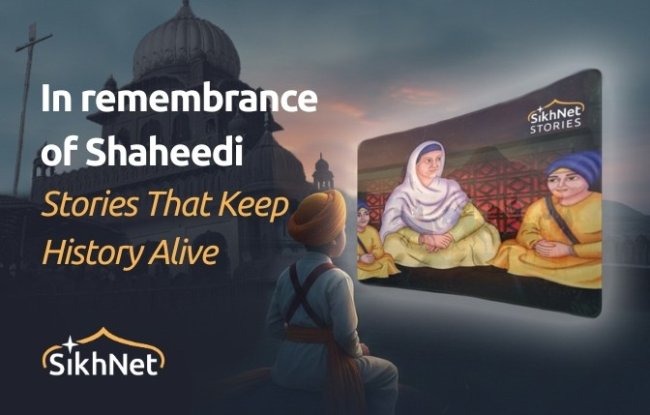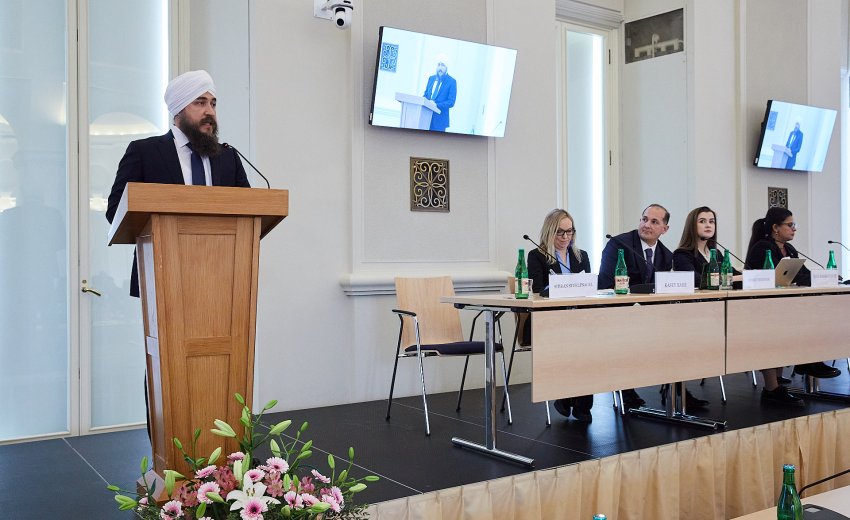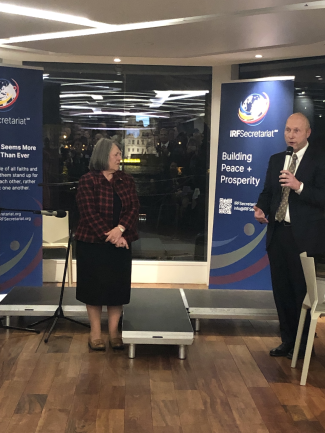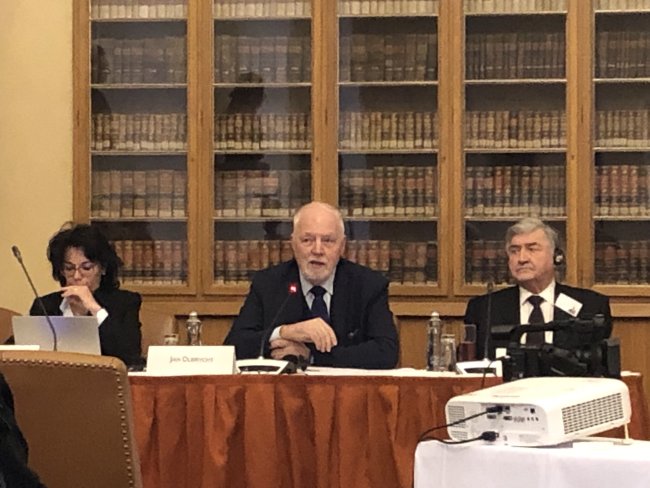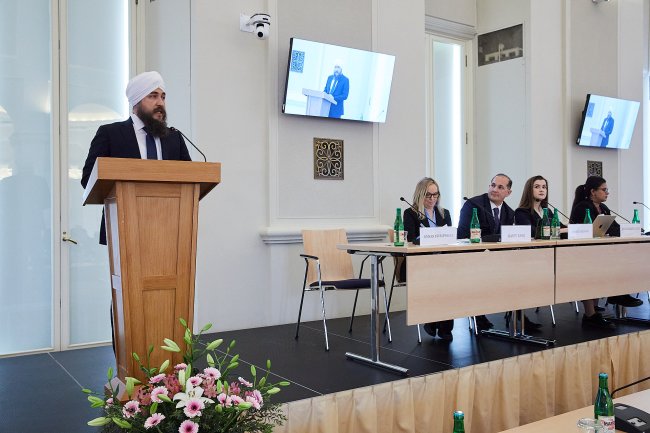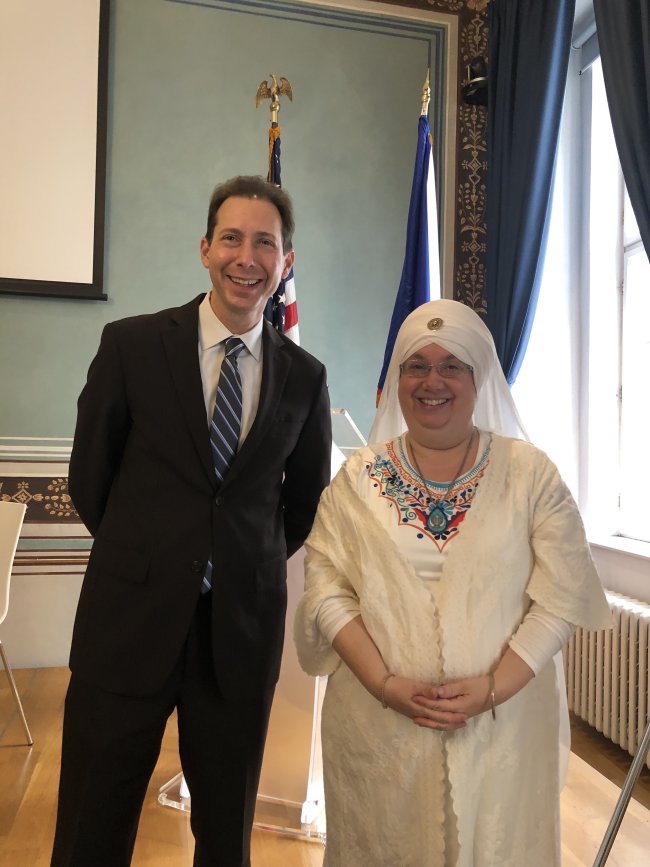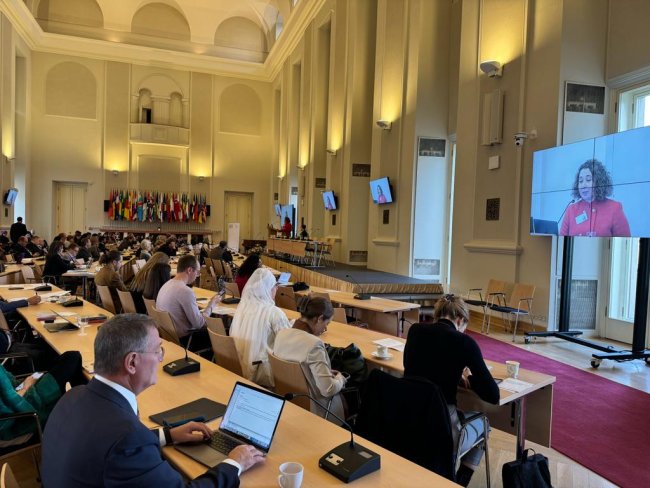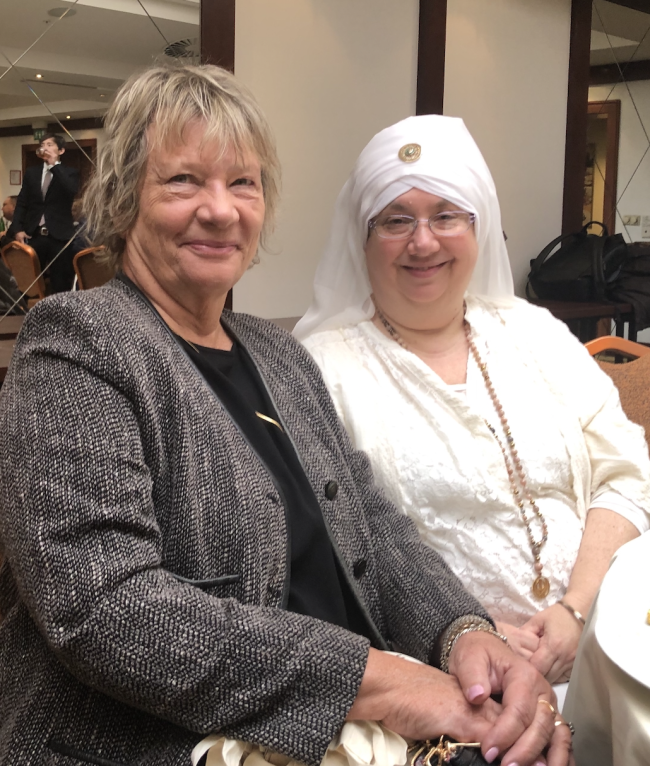Long before there was the United States Bill of Rights or the United Nations’ Universal Declaration of Human Rights, Guru Naanak, the founder of the Sikh path, understood the essential importance of people being able to practice their religion freely.
In the late 15th century, Guru Naanak took his message of Oneness – Ek Ong Kaar – and walked the world for decades sharing this vision through song. The Hindus called him Guru. The Muslims called him Baba. The Buddhists called him Lama. Wherever he went, the religious traditions of those places honored him as a person of profound wisdom. He taught that our common humanity is our highest spiritual bond, that all spiritual traditions come from the same Source and lead back to that Source, and that peaceful co-existence among faiths is not only possible, but necessary.
This issue of peaceful co-existence among religions and the freedom for people to practice their beliefs is shaping up to become the defining global political issue of a generation. Whether we look at the war in Israel and Gaza, the recent question of whether the Indian government is plotting the assassination of Sikh separatists abroad, or the struggle of Ukraine to maintain its unique cultural identity in the face of Russian aggression – there is a question in the air. Can democracy, which promises the possibility of peaceful pluralism among different religions and philosophies, prevail? Or will autocratic governing systems which persecute minority religious and political views take command of the world stage?
From November 28 to November 30, in Prague, the Czech Republic, the issue of religious freedom was engaged by representatives of 42 countries at the 2023 International Ministerial Conference on Freedom of Religion or Belief. The conference was hosted by the Czech Republic’s Foreign Ministry and moderated by the Czech Republic’s Ambassador Robert Řehák, Special Envoy for Holocaust, Interfaith Dialogue and Freedom of Religion.
Over three days, dozens of dignitaries participated in powerful panels including speakers such as Jan Lipavský, Minister of Foreign Affairs, Czech Republic; Eduard Hulicius, Deputy Minister of Foreign Affairs, Czech Republic; Fiona Bruce, MP, British Prime Minister’s Special Envoy for Freedom of Religion or Belief; noted Oxford University mathematician and philosopher John Lennox; Harbir Kaur Bhatia, CEO, Silicon Valley Central Chamber of Commerce and many others. See full program here.
The conference was supported by a number of civil society groups including The Institute of International Relations Prague (IIR); the IRF Secretariat; the Czech Bishops’ Conference; The Ecumenical Council of Churches in the Czech Republic; The Federation of Jewish Communities in the Czech Republic; The Institute for Christian-Democratic Politics; Templeton Religion Trust; and The Red Wednesday campaign.
It was my blessing to be in Prague during the time the conference took place and witness a few of the panels. The topics were thoughtful, timely and relevant. Presenters were the top experts in their fields. Here are some photos and a brief summary of panels that I attended.
How To Get Freedom of Religion Into Public Discourse?
On Wednesday, November 29, 2023, at Charles University in Prague, a panel took place titled: How To Get Freedom of Religion Into Public Discourse? The presenters were Jan Olbrycht, Member of European Parliament; Paul Marshall, Senior Fellow at Religious Freedom Institute and Hudson Institute; and Eva Saenz Diez, Researcher on Education in the Arab world and Freedom of Religion and Belief in Arab and Muslim countries, Catholic University of Louvain.
During the panel discussion, Jan Olbrycht expressed some frameworks that I found helpful. Paraphrasing his comments, he asked: “The question is – what is state and what is church? The other question is – what is politics and what is religion? These,” he offered, “are not the same questions.”
He also gave voice to a perspective that is important to keep in the front of our minds. “Religion might be used to instigate a conflict. But it is not the origin of the conflict. Conflict is about power, not religion. Don’t be provoked by the simplified narrative.”
The next speaker, Paul Marshall, called out media illiteracy when it comes to religions. This, for me, was one of the most important ideas I heard during my time in Prague. Again, paraphrasing, he said:
“The media does a terrible job covering religious freedom. The secular perspective dominates and there are a lot of mistakes (in the way media covers religions). The fact that something is political or economic doesn’t mean it can’t be religious. Human motivations are not just money, sex and power, but also faith. People do things because it is what God wants them to do – they will even die for it. Politicians can only manipulate religious sentiment if there is religious sentiment to begin with.”
Listening to these speakers and other speakers on the panel, it struck me that those of us in the media – especially religious or spiritual media – need to take responsibility for building religious literacy with our readers. We also need to delve into the religious dimension of global affairs without fear so that solutions to our current problems can be created with a mind towards peaceful co-existence among faiths.
Technology and Corporations: How Social Media Platforms and Artificial Intelligence Can Protect FoRB
Technology corporations are not necessarily part of international treaties, and therefore have no clear commitment to protecting universal human rights. Yet the way that technology has become the de-facto public square for much of the world means that these companies impact freedom of belief and expression in fundamental ways.
On Wednesday, November 29, at the Main Hall of the Czernin Palace, a panel discussion took place on this subject. I was grateful to view the panel via zoom. The panel was moderated by Simran Stuelpnagel, Vice Chair, IRF Secretariat. The panelists were: Harbir Bhatia, CEO, Silicon Valley Central Chamber of Commerce; Robert Beringer, Founder & CEO, EOR – Electronic On Ramp; Kasey Barr, Ph.D., Fellow at the Program for Democratic Resilience and Development (PDRD), Reichman University; Egle Markeviciute, Public Affairs Specialist and the Head of Digital & Innovation Policy, Lithuania.
The panel was a lively, interactive discussion. Some of the key take-aways from the panel include:
- With less than a hundred data points, social media companies know more about us than our parents, and with a few hundred clicks, they know more than our spouses. They have hundreds of thousands of information points on us, suggesting that our thoughts are no longer private. Essentially, what used to be considered private is now recorded, conjectured, analyzed, and sold.
- A century ago, government regulatory frameworks took decades to catch up to the industrial revolution. Similarly, giant tech companies, social media and rapidly evolving AI tools are not sufficiently regulated, and probably won't be regulated quickly. Nations need to do their job and find ways to move at the speed of innovation when it comes to regulation.
- Small communities under threat need to work with social media giants and their AI to identify content that can lead to harm, violence or genocide. Content checkers are needed broadly. The exile of the Rohingya from Myanmar, for instance, was significantly fueled by social media.
Wolf at the Door: Challenges to International Norms on Freedom of Expression/Freedom of Religion or Belief
Articles 18 and Articles 19 of the UN’s Universal Declaration of Human Rights go hand in hand. Article 19 states that everyone has the right to freedom of opinion or expression while Article 18 declares that everyone has the right to freedom of thought, conscience and religion. Yet in our public discourse, these rights can create discord – especially when someone’s freedom of expression insults another’s freedom of religion. How to handle this delicate balance, especially in a world of misinformation, disinformation and the weaponization of technology to destabilize democracy?
On Thursday, November 30, 2023 at the American Center in Prague, these issues were deeply discussed during the panel: Wolf at the Door: Challenges to International Norms on Freedom of Expression/Freedom of Religion or Belief.
The panel was organized by Daniel L. Nadel, Director of the Office of International Religious Freedom, US Department of State. Panelists spoke about current events in Sweden relating to the minority Muslim community there. A citizen of Sweden decided to exercise their freedom of expression by regularly burning the Quron. This has created a genuine diplomatic crisis for Sweden with some majority Muslim countries not understanding why burning the Quron is protected speech. This act has also stirred protests among the Muslims in Sweden. In the meantime, foreign actors seeking to undermine Swedish democracy are exploiting this situation to spread dis and mis information, fueling the disagreement. In a video that went viral, AI manipulated a speech by Swedish Prime Minister Ulf Kristersson to make it seem like he said, “Israel has the right to commit genocide (in reference to Gaza).” This was not what he said. Rather, the video footage was altered through the malicious application of AI tools. With the viral nature of social media, the situation has created a significant problem.
Panelists also spoke about the ways that the UN has been building up legal frameworks to resolve disputes relating to apparent conflicts of Articles 18 and 19, while preserving the integrity of both.
I found this panel intriguing because it speaks directly to the issue of tolerance. To co-exist peacefully, citizens need to be tolerant towards views that one may find distasteful or even offensive. Extremes on any side – whether burning the Quron multiple times or threatening someone’s life because of religious insult – is, in my view, the real issue here. Societies need some level of tolerance and also some level of respect towards various views and perspectives in order to create peaceful co-existence.
(Ek Ong Kaar Kaur with David Nadel, Director of the Office of International Religious Freedom - US Department of State).
Intercultural and Interfaith Dialogue: Freedom of Religion and Women's Rights
On the last afternoon of the conference, with the very kind permission of Ambassador Robert Řehák and with the assistance of the IRF Secretariat, I had the privilege to attend the Freedom of Religion and Women’s Rights panel. It was a tremendous honor to be there. The panel, like much of the program for the International Ministerial Conference on Freedom of Religion or Belief, was hosted at the historic Czernin Palace in Prague. This building, like Prague, itself, is so beautiful. I wish I had time to just walk around and photograph it.
The keynote speaker for the session was Rola El-Husseini, Associate Professor, Centre for Middle Eastern Studies, Lund University. The discussion after the keynote included panelists Alimatul Qibtiyah, Commissioner, The National Commission on Violence against Women; Professor, UIN Sunan
Kalijaga Yogyakarta; Mariz Tadros, Professor, Institute of Development Studies, University of Sussex; Director, CREID; and Elisa Chavez, Human Rights Adviser, Stefanus Alliance International.
In all honesty, there is no way to do this session justice in a couple of paragraphs. As a woman who has explored various faith traditions and who ended up with Guru Naanak, I deeply understand how religious thought and human rights can conflict regarding women’s identity and self-autonomy. Over 500 years ago, Guru Naanak pushed back against the religious justification for holding women as inferior in society. But this dialogue about the role, purpose and identity of woman continues. There are very real dynamic tensions between some religious views of women and the human rights’ perspective.
Overall, I found it heartening listening to well-educated women experts speak to these issues from their own sovereign understanding. Dr. Alimatul Qibtiyah offered powerful insights about gender inequality in Islam and shared frameworks to create understanding around the conservative, moderate and liberal viewpoints in the Muslim community. Mariz Tadros, Program Director of the Coalition for Religious Equality and Inclusive Development (CREID) explored the subject of how to develop a FoRB-sensitive gender equality agenda. All the women who spoke shared insights from their research, their own journey and their hopes for the future.
Clearly, this simple (and already lengthy) article can never do justice to all the speakers that I heard in Prague. And I only attended a sample of the many wonderful panels created. If I could make one suggestion to the conference organizers it would be this: please consider publishing a journal with all of the talks and presentations made during the 2023 International Ministerial Conference on Freedom of Religion or Belief. I believe that you would find an audience for the perspectives given during the conference.
Special thanks to the IRF Secretariat team including Greg Mitchell and Sharyn Runyon for hosting me so graciously and for giving me a bridge into the events.
(Ek Ong Kaar Kaur with Sharyn Runyon, Chief of Staff, IRF Secretariat)
